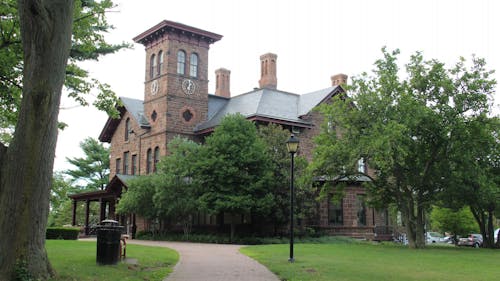Douglass Residential College continues program to support women in STEM virtually

The Douglass Project for Women in STEM is a program spearheaded by Douglass Residential College (DRC) to give support and opportunities to female undergraduate students pursuing degrees and careers in science, technology, engineering and math. Due to the ongoing coronavirus disease (COVID-19) pandemic, the program’s events and initiatives have shifted to virtual platforms.
Jacqueline Medina, the program coordinator of computer science initiatives, discussed the initiative’s layout and opportunities as well as its overall mission.
Women are vastly underrepresented in STEM, making up only 28 percent of the field's labor force, according to the American Association of University Women (AAUW). Medina said that the Douglass Project aims to reduce this disparity by providing tools to undergraduate women to navigate STEM academia, research and networking.
“Women are not well-represented in all STEM fields, so the Douglass Project exists to challenge that representation,” she said. “We give students tools that foster their development as learners, leaders and well-rounded professionals.”
Medina said the Douglass Project can be divided into three main areas which include mentoring, events and programs. For mentoring, students in the program can bond with and receive advice from staff, peer and professional mentors who share their experiences as women in STEM, she said.
One of the Douglass Project’s key programs is Project Science for Undergraduates: A Program for Excellence in Research (SUPER) which focuses on providing opportunities to students who are unfamiliar with scientific research, Medina said.
Project SUPER’s signature course is Introduction to Scientific Research, which gives students a preview of scientific research, procedure and conduct, she said. Students are assisted by the Research Advisory Board, which is made up of peer mentors who oversee students’ progress as STEM researchers.
She said that Project SUPER also extends into the Project SUPER Summer Research Scholars program, which provides students with a stipend for conducting research over the summer. Throughout the entire process students will be given support either by staff mentors or peers, Medina said.
Community and networking are fostered by program events such as RU Research Ready?, the Project SUPER Research Symposium, the Annual STEM Networking Night and independent events hosted by DRC STEM living-learning communities, she said.
Due to the ongoing pandemic, the program's annual Project SUPER Research Symposium transformed from a live event to a website with pre-recorded presentations and keynote speeches, she said. Virtual programs have their own special benefits, said Kayla Fowler, director of experiential STEM programs at DRC.
“All of our events have moved to virtual platforms (and) our larger events have seen increases in participation,” she said. “Assuming students don't have to worry about commuting home, whether it is on or off-campus for our late-night events, they’re engaging and participating more."
Medina said the Douglass Project has also created new online programs such as the Douglass Project CATALYSTS (Celebrating Achievement, Transforming Attitudes, Living Your Success Through STEM) to better connect students to those with similar areas of study and allow them to build community, even during a remote academic year.
Looking to the future, she said the Douglass Project strives to improve itself based on student engagement and feedback.
Factors that significantly contribute to the underrepresentation of women in STEM include male-dominated work environments and a lack of female role models in the field, according to the AAUW. The Douglass Project’s emphasis on community and guidance aims to counter these factors, Medina said.
“Douglass, as a whole, will be working on how we organize the Douglass experience for all students — including the Douglass Project’s role in experiential learning, mentoring and professional development,” she said.



